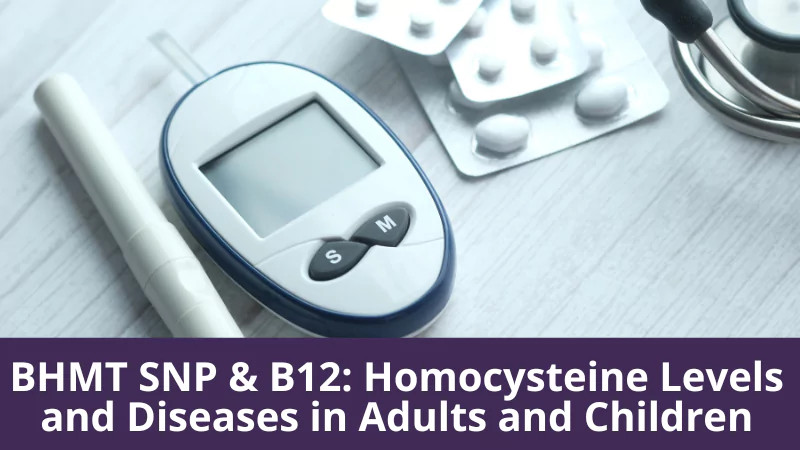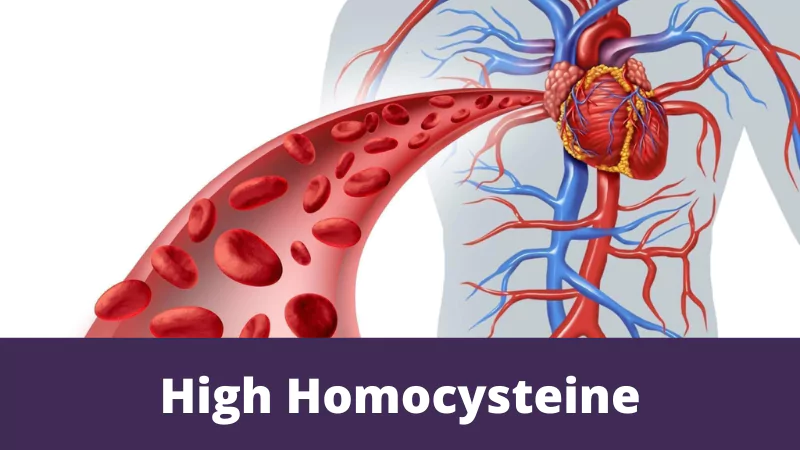Homocysteine Levels and Diseases in Adults and Children
Higher homocysteine level is a critical risk factor in adults and children because it may increase the risks of different health issues related to homocysteine levels in the body. The body has different mechanisms protecting itself from being damaged by elevated homocysteine levels. Different mechanisms work together to convert and reduce homocysteine levels in the blood, the peripheral tissues and organs, and the brain. One of these mechanisms is the functions of BHMT.
What is BHMT (Betaine-homocysteine S-methyltransferase)?
We all know that homocysteine metabolism involves re-methylation. It is a step required for the methylation of homocysteine to convert it to methionine. This step can be done by catalysing it by methionine synthase; and the alternative is catalysing it by BHMT, its full name as betaine-homocysteine S-methyltransferase.[1] When comparing methionine synthase and BHMT, both require folate and vitamin B12 as co-factors; but BHMT exists only in the liver, kidneys and brain. And thus, inadequate levels of either folate or B12 may cause insufficient methylating conversion of homocysteine, leading to higher homocysteine levels with damaging consequences especially in the brain.
Here we learn that BHMT works similarly to methionine synthase, and its functions are converting and reducing homocysteine levels in the body. The importance of BHMT is controlling homocysteine levels to ensure no damage is caused by homocysteine; and this important function needs folate and B12. When either folate or b12 is reduced, BHMT will not be able to keep its functions going, particularly in an 5-MTHF B12 deficiency.
MTHFR and B12 Deficiency
Non-surprisingly, it is found that in people with MTHFR polymorphisms, they have a greater possibility of having a B12 deficiency as well as a higher levels of homocysteine. On the other hand, in those with B12 deficiency, they also have a higher chance of having an MTHFR polymorphism.[2] These facts indicate the necessity to test people with the MTHFR gene mutation, for B12 deficiency; and to test the B12 deficiency population for MTHFR mutations. This is necessary because the co-existance of MTHFR and B12 deficiency means dual abnormalities of homocysteine metabolism, leading to severe elevated homocysteine levels and its damaging consequences.
This means it is critically important for any one with MTHFR to test their B12 levels and to identify if there is also a B12 deficiency. If so, early diagnosis can stop an elevation in homocysteine.
We also need to bear this in mind when supplementing B12 and folate. Since the metabolism of either B12 or folate needs each other, we must ensure that both folate and B12 are sufficient. In this instance methylcobalamin, and a methyl folate such as 5-MTHF will be better because they are the active forms bioactive nature, which requires less processing in the body to make them function properly.
BHMT SNP and MTHFR & B12 Deficiency
SNP means single nucleotide polymorphism, and it is the most common type of genetic variation among people. Each SNP, for instance, each BHMT SNP, represents a unique and different DNA building block called nucleotide. This means each of you carry your own BHMT SNP, and some of these unique BHMT SNPs may have reduced functions.1
We already learnt above that the normal functions of BHMT require both B12 and folate, to reduce homocysteine levels efficiently. When we have a BHMT deficiency or reduced function, inadequate supplements of either B12 or folate will reduce BHMT functions further.
BHMT SNP, Homocysteine Levels and Diseases in Adults and Children
Those people with BHMT SNP’s that cause a slowing of BHMT function are reported to have higher risks of multiple diseases. One of the risks is colorectal cancer in women, which happens because of the lower function of BHMT and inadequate intake of dietary folate.[3] The risk of colorectal cancer can be worse if alcohol intake is involved. Another risk is cardiovascular disease in men, which is due to the interactions between BHMT SNP and folate.[4] This indicates that those men with lower BHMT functions and an inadequate intake of folate may have a higher risk of cardiovascular disease.
Mothers with lower function of BHMT together with inadequate supplements of B12 and folate may see higher risk of different diseases in their babies. A research on 930 babies found that lower functions of BHMT together with insufficient B12 and folate may cause omphalocele in babies.[5] (Omphalocele, is a rare abdominal wall defect in which the intestines, liver, and occasionally other organs remain outside of the abdomen in a sac because of a defect in the development of the muscles of the abdominal wall).
Another research study reports that the interactions between lower function of BHMT SNP and MTHFR may increase the risk of Down syndrome due to higher levels of homocysteine.[6] Furthermore, mothers with lower BHMT functions such as lower betaine to dimethylglycine ratio and higher level of dimethylglycine have higher risk of having babies with congenital heart defects.[7] These babies with congenital heart defects also have lower betaine to dimethylglycine ratio, higher level of dimethylglycine, and higher level of S-adenosylmethionine in their bodies.
In clinical practice, I see people with BHMT SNP’s – particularly BHMT 08 homozygous snps tend to have more gut issues. If they support this with betaine hydrochloride or good old fashioned hydrochloric acid, they definitely improve. The cofactor for BHMT is zinc so we need to be checking there are adequate levels of that too. The problem is that you need good levels of zinc to have good levels of hydrochloric acid and vice versa.
Summary
The co-existance of MTHFR, B12 deficiency and BHMT SNP’s may contribute to higher homocysteine levels . So we need to check these levels. Gut function is more than likely going to be an issue in those people with BHMT homozygous snps. So check hydrochloric acid levels, help gut restoration, support with zinc and always check B12 and folate levels.
Bibliography
[1] Zhang Y, Zhu T, Wang L, Pan Y-H, Zhang S. Homocysteine Homeostasis and Betaine-Homocysteine S-Methyltransferase Expression in the Brain of Hibernating Bats. Baker ML, ed. PLoS ONE. 2013; 8(12): e85632. PubMed PMC 3871600
[2] Shiran A, Remer E, Asmer I, Karkabi B, Zittan E, Cassel A, Barak M, Rozenberg O, Karkabi K, Flugelman MY. Association of Vitamin B12 Deficiency with Homozygosity of the TT MTHFR C677T Genotype, Hyperhomocysteinemia, and Endothelial Cell Dysfunction. The Israel Medical Association journal. 2015; 17(5): 288-92. PubMed PMID: 26137654
[3] Hazra A, Wu K, Kraft P, Fuchs CS, Giovannucci EL, Hunter DJ. Twenty-four non-synonymous polymorphisms in the one-carbon metabolic pathway and risk of colorectal adenoma in the Nurses’ Health Study. Carcinogenesis. 2007; 28(7): 1510-9. PubMed PMID: 17389618
[4] Wernimont SM, Clark AG, Stover PJ, Wells MT, Litonjua AA, Weiss ST, Gaziano JM, Vokonas PS, Tucker KL, Cassano PA. Folate network genetic variation predicts cardiovascular disease risk in non-Hispanic white males. The Journal of Nutrition. 2012; 142(7): 1272-9. PubMed PMID: 22649255
[5] Mills JL, Carter TC, Kay DM, Browne ML, Brody LC, Liu A, Romitti PA, Caggana M, Druschel CM. Folate and vitamin B12-related genes and risk for omphalocele. Human Genetics. 2012; 131(5): 739-46. PubMed PMID: 22116453
[6] Biselli JM, Zampieri BL, Goloni-Bertollo EM, Haddad R, Fonseca MF, Eberlin MN, Vannucchi H, Carvalho VM, Pavarino EC. Genetic polymorphisms modulate the folate metabolism of Brazilian individuals with Down syndrome. Molecular Biology Reports. 2012; 39(10): 9277-84. PubMed PMID: 22903356
[7] Alsayed R, Al Quobaili F, Srour S, Geisel J, Obeid R. Elevated dimethylglycine in blood of children with congenital heart defects and their mothers. Metabolism. 2013; 62(8): 1074-80. PubMed PMID: 23481916









